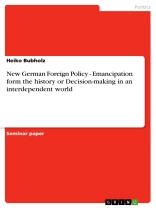Seminar paper from the year 2002 in the subject Politics – Topic: German Foreign Policy, grade: 1, 2 (A+), Jagiellonian University in Krakow (Centre for European Studies), course: Germany s Place in Europe – From 1870 to the present, language: English, abstract: It is remarkable how efficient the German post-World War II education works when even the Parliament’s President Wolfgang Thierse publicly articulates not being able to feel proud of his country’s achievements. Though this testimony occurred only in 2001, it once more makes the fact apparent, that Germany’s historic perception is often reduced to the 12 worst years of Europe’s recent history. Nonetheless, this type of peculiar German discussion reveals the society’s political division, but is “also reaffirming the German effort pursued over five decades through education, public policy and citizen activism, to draw le ssons from the evils of the Third Reich” 1.
Admittedly, it happened in the modern Germany that a malicious regime usurped the most dangerous weapon human mankind ever had created – the modern nation state – and that German population and elites let it happen. To put it in the words of Hagen Schulze: During Hitler’s Third Reich it became evident what the concept of total nationstate is able to do, if it is thought to the absolute end’2. But since these shadowy days many things changed. Germans probably became matured. Under the Cold War pressure the world gained a new shape. Germany was integrated into the Western hemisphere and particularly in the successful West European group of states, while it became one of the influential forces in this process – not only to achieve some of its sovereignty and to proof its future reliability. Moreover, Germany’s role in Europe and in the world – especially after its reunification – changed significantly.
Yet, the rhetoric proclaiming “Never again Auschwitz”3 and the underneath attitude continuingly determines decision-making in spheres of German foreign and security policy. This became particularly apparent when the German Parliament had to decide whether or not to engage actively in the NATO’s Kosovo campaign. Nonetheless, German foreign policy witnessed in the recent years and due to recent developments in international affairs a visible emancipation from its former historically determinate restriction. External pressure and growing internal confidence in own abilities and unknown potentials led to an engagement in European as well as in extra-European diplomatic or even military activities. However, it may be assumed that these commitments are based only on a weak or unsecured foundation in terms of public support, since these obligations did so far not have cope with serious cha llenges.
[…]
Heiko Bubholz
New German Foreign Policy – Emancipation form the history or Decision-making in an interdependent world [EPUB ebook]
New German Foreign Policy – Emancipation form the history or Decision-making in an interdependent world [EPUB ebook]
Buy this ebook and get 1 more FREE!
Language English ● Format EPUB ● Pages 44 ● ISBN 9783638138581 ● File size 1.3 MB ● Publisher GRIN Verlag ● City München ● Country DE ● Published 2002 ● Edition 1 ● Downloadable 24 months ● Currency EUR ● ID 3751458 ● Copy protection without












